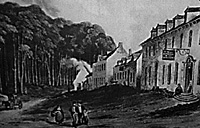'It has been a damned serious business,' Wellington told his friend Thomas Creevey the day after the Battle of Waterloo. ' It has been a damned nice thing – the nearest run thing you ever saw in your life.' [1] All historians agree that Napoleon could have won a decisive victory in the 1815 campaign. But which of Napoleon's decisions were most fatal and what would have happened if he had pursued different options?
Wellington himself considered that Napoleon was wrong to invade the United Netherlands at all. Instead, he could have built up his strength to defend France against the allied invasion in July: 'Napoleon ... might have played again the same game which he had played so admirably the year before – that campaign of 1814 I consider the very finest he ever made – he might have manoeuvred from one invading army to the other and attacked them separately. Instead of this, by Waterloo he put an end to the war at once.' [2]
But the political drawbacks of fighting on French soil outweighed any military advantages. A glorious and aggressive campaign soon after his return from exile would consolidate Napoleon's grip on power. The seizure of Belgium would be popular in France and would provide a source of
additional soldiers.
Risky Invasion
An invasion of the United Netherlands with just 124,000 men against the 210,000 troops of the Duke of Wellington and Prince Gebhard von Blücher was certainly risky. But it was also a daring pre-emptive strike and could greatly lessen the impact of the allied invasion of France in July. Napoleon later considered that he appointed the wrong men as his chief subordinates. In particular, he regretted not having taken the brilliant Marshal Louis Suchet with him instead of the unlucky Marshal Emmanuel de Grouchy. But Napoleon could not have had good generals with his Army of the North as well as reliable subordinates in charge at Paris, the political nerve centre of France.
Napoleon was over-confident that his campaign would be easy and that his best generals, Marshals Davout and Suchet, could be left at Paris and Lyons to prepare to meet the Austro-Russian invasion of France in July. Indeed, the presence of brilliant generals with the Army of the North would mean that Napoleon would have to share the glory resulting from any victory. Napoleon desperately needed a personal triumph to re-establish his military reputation and to consolidate his hold on France.
Napoleon was desperately short of good senior subordinates, for so many of his marshals were dead, retired or loyal to the Bourbons. Marshal Louis Berthier, the former chief-of-staff, was dead and his place taken by Marshal Nicolas Soult who, whatever his other merits, was a disaster as chief-of-staff. It was Napoleon's worst appointment and a better man in that key position would have avoided Soult's errors which for Napoleon snatched defeat from the jaws of victory.
Footnotes
[1] A. Brett-James, The Hundred Days (1964), p.183 Waterloo Continued:
Related Articles
This article appears in MagWeb (Magazine Web) on the Internet World Wide Web. At right, Wellington's Headquarters at Waterloo from a contemporary illustration circa 1816. © David Watkins.
At right, Wellington's Headquarters at Waterloo from a contemporary illustration circa 1816. © David Watkins.
 At right, Wellington's Headquarters at Waterloo in 1995. © David Watkins.
At right, Wellington's Headquarters at Waterloo in 1995. © David Watkins.
[2] Earl Stanhope, Notes of Conversations With the Duke of Wellington 1831-1851 (1938), pp.59-60
Waterloo Myths
Was Wellington a Defensive Commander?
How Wellington Got His Name
Waterloo: New Perspectives and the Siborne Manuscripts
Back to Table of Contents -- First Empire #29
© Copyright 1996 by First Empire.
Other military history articles and gaming articles are available at http://www.magweb.com